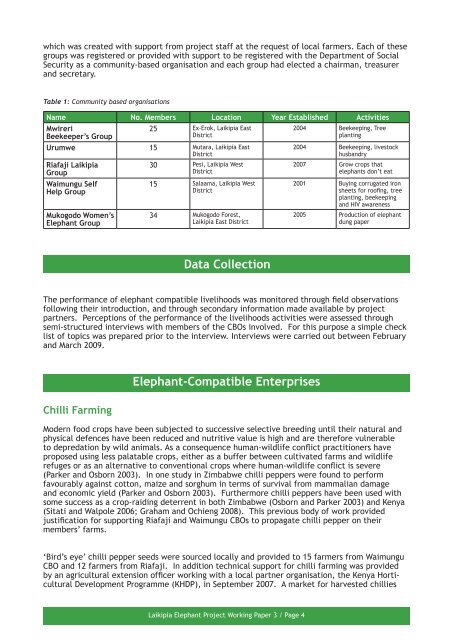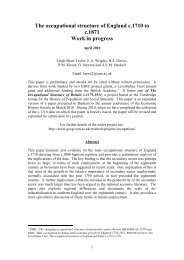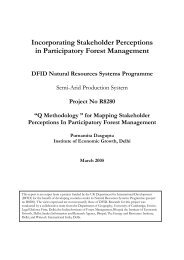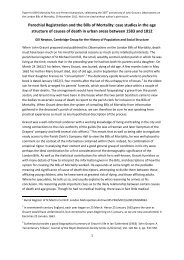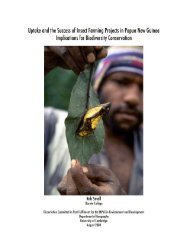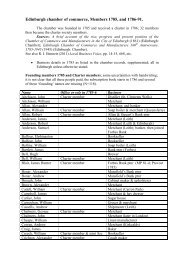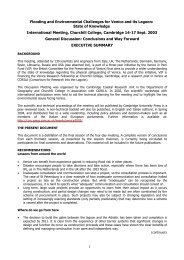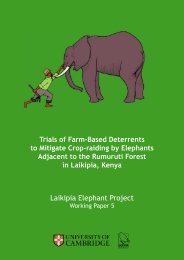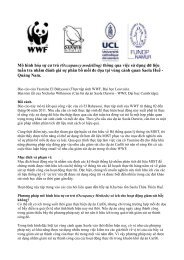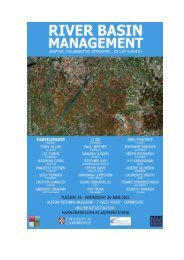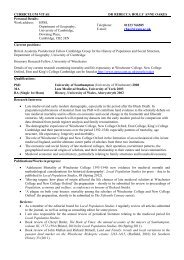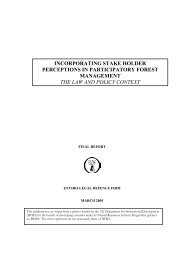An Assessment of Elephant-Compatible Livelihoods - University of ...
An Assessment of Elephant-Compatible Livelihoods - University of ...
An Assessment of Elephant-Compatible Livelihoods - University of ...
You also want an ePaper? Increase the reach of your titles
YUMPU automatically turns print PDFs into web optimized ePapers that Google loves.
which was created with support from project staff at the request <strong>of</strong> local farmers. Each <strong>of</strong> these<br />
groups was registered or provided with support to be registered with the Department <strong>of</strong> Social<br />
Security as a community-based organisation and each group had elected a chairman, treasurer<br />
and secretary.<br />
Table 1: Community based organisations<br />
Name No. Members Location Year Established Activities<br />
Mwireri<br />
Beekeeper’s Group<br />
25 Ex-Erok, Laikipia East<br />
District<br />
Urumwe 15 Mutara, Laikipia East<br />
District<br />
Riafaji Laikipia<br />
Group<br />
Waimungu Self<br />
Help Group<br />
Mukogodo Women’s<br />
<strong>Elephant</strong> Group<br />
30 Pesi, Laikipia West<br />
District<br />
15 Salaama, Laikipia West<br />
District<br />
34 Mukogodo Forest,<br />
Laikipia East District<br />
2004 Beekeeping, Tree<br />
planting<br />
2004 Beekeeping, livestock<br />
husbandry<br />
2007 Grow crops that<br />
elephants don’t eat<br />
2001 Buying corrugated iron<br />
sheets for ro<strong>of</strong>ing, tree<br />
planting, beekeeping<br />
and HIV awareness<br />
2005 Production <strong>of</strong> elephant<br />
dung paper<br />
Data Collection<br />
The performance <strong>of</strong> elephant compatible livelihoods was monitored through field observations<br />
following their introduction, and through secondary information made available by project<br />
partners. Perceptions <strong>of</strong> the performance <strong>of</strong> the livelihoods activities were assessed through<br />
semi-structured interviews with members <strong>of</strong> the CBOs involved. For this purpose a simple check<br />
list <strong>of</strong> topics was prepared prior to the interview. Interviews were carried out between February<br />
and March 2009.<br />
<strong>Elephant</strong>-<strong>Compatible</strong> Enterprises<br />
Chilli Farming<br />
Modern food crops have been subjected to successive selective breeding until their natural and<br />
physical defences have been reduced and nutritive value is high and are therefore vulnerable<br />
to depredation by wild animals. As a consequence human-wildlife conflict practitioners have<br />
proposed using less palatable crops, either as a buffer between cultivated farms and wildlife<br />
refuges or as an alternative to conventional crops where human-wildlife conflict is severe<br />
(Parker and Osborn 2003). In one study in Zimbabwe chilli peppers were found to perform<br />
favourably against cotton, maize and sorghum in terms <strong>of</strong> survival from mammalian damage<br />
and economic yield (Parker and Osborn 2003). Furthermore chilli peppers have been used with<br />
some success as a crop-raiding deterrent in both Zimbabwe (Osborn and Parker 2003) and Kenya<br />
(Sitati and Walpole 2006; Graham and Ochieng 2008). This previous body <strong>of</strong> work provided<br />
justification for supporting Riafaji and Waimungu CBOs to propagate chilli pepper on their<br />
members’ farms.<br />
‘Bird’s eye’ chilli pepper seeds were sourced locally and provided to 15 farmers from Waimungu<br />
CBO and 12 farmers from Riafaji. In addition technical support for chilli farming was provided<br />
by an agricultural extension <strong>of</strong>ficer working with a local partner organisation, the Kenya Horticultural<br />
Development Programme (KHDP), in September 2007. A market for harvested chillies<br />
Laikipia <strong>Elephant</strong> Project Working Paper 3 / Page 4


